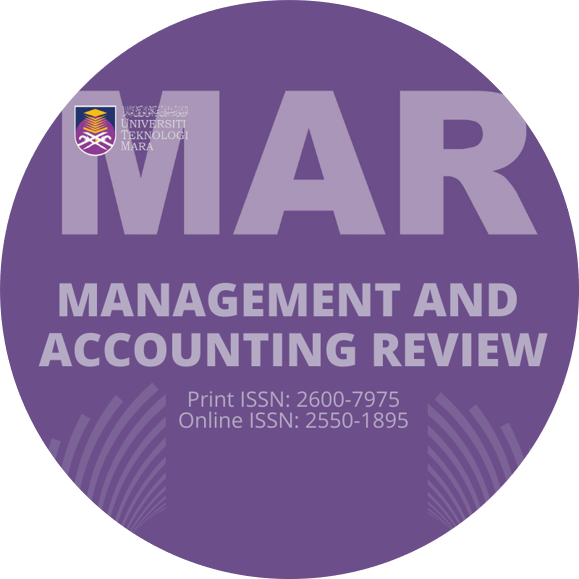Volume 15 No. 1, June 2016
ARTICLE INFO
Article History:
Received: 5 October 2015
Accepted: 21 March 2016
Published: 23 June 2016
MANAGEMENT AND ACCOUNTING REVIEW, VOLUME 15 NO. 1, JUNE 2016
Social Capital and Innovation Capital: Accountability towards Small Medium Enterprises’ (SMEs) Sustainable Performance
Amrizah Kamaluddin1, Hazirah Akmal Hasan1, Roshayani Arshad1 and Siti Akmar Abu Samah2
1Faculty of Accountancy and Accounting Research Institute,
Universiti Teknologi MARA, Malaysia
2Academy of Language Studies,
Universiti Teknologi MARA, Malaysia
1Faculty of Accountancy and Accounting Research Institute,
Universiti Teknologi MARA, Malaysia
2Academy of Language Studies,
Universiti Teknologi MARA, Malaysia
ABSTRACT
SMEs have the potential role to substantially contribute to the current and future economy. In today’s complex business environment, SMEs are facing various challenges in surviving and sustaining their operations. The sudden economic changes and globalization have seen many small enterprises failed in managing their business. In this innovation capital and social capital are two main intangible resources in the organization, which are vital for sustainable performance in any organization. Hence, in discharging their accountability towards the relevant stakeholders, SMEs should deploy their intangible resources. In this regard, the main aim of this study is to investigate the relationship between innovation capital and social capital with SMEs performance. Data were captured via questionnaires, which were distributed to eighty SMEs companies in four states in Malaysia. The results of the study provide evidence that innovation capital and social capital influence the performance of SMEs. In addition, all the dimensions under innovation capital and social capital which are innovation capabilities, innovation culture, structural and relational are significantly positive related with SMEs performance. This reflects that intangible resources in SMEs being capability, culture in working environment, social interaction within organization, network, and the strength of ties among the employee are crucial to influence the efficiency of SMEs organization. Thus, the results of this study offer guidelines and evidences for SMEs in managing their intangible resources in order to be competitive and sustainable in business.
Keywords: Innovation capital, social capital, SMEs, SMEs performance, sustainable performance
Keywords: Innovation capital, social capital, SMEs, SMEs performance, sustainable performance





